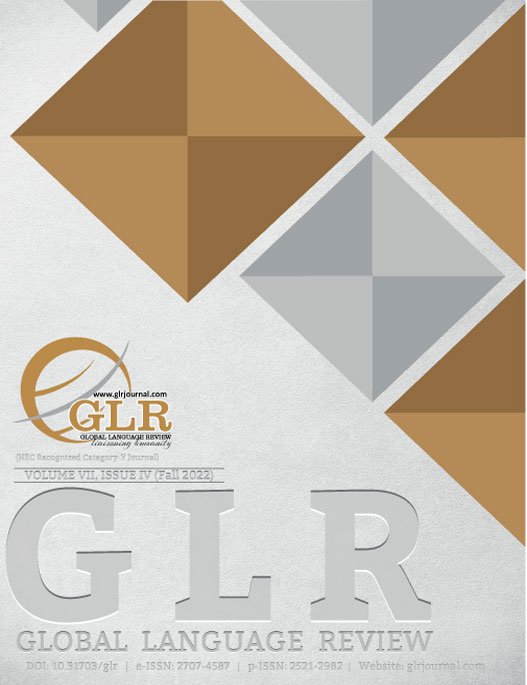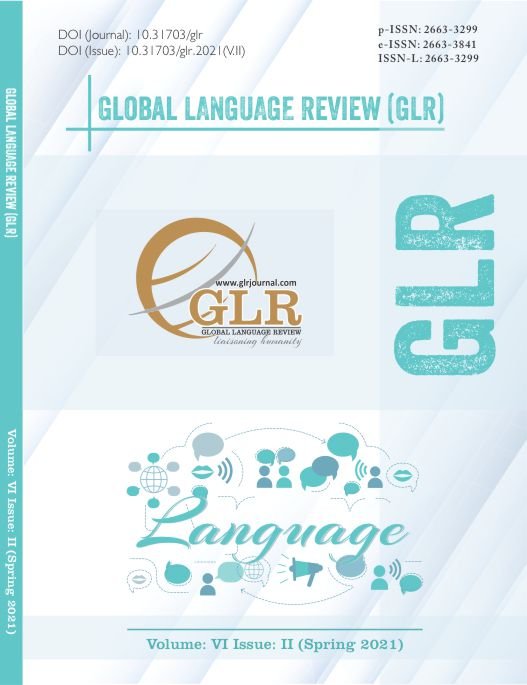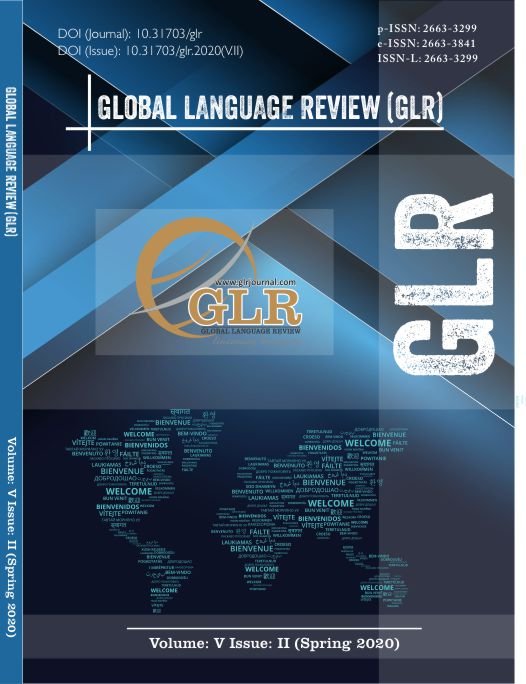01 - Proverbial Rhetoric in Sustenance of Gender Stereotypes: An Ethnological Account
http://dx.doi.org/10.31703/glr.2020(V-II).0110.31703/glr.2020(V-II).01 Published : Jun 2020
-
Language is the most effective tool of communication across cultures. Proverbs are one such component of stylistic poetic and rhetoric devices which serves to communicate the worldview of an ethnic group. The paper is an analysis of ways in which gender differences are perceived, symbolized, portrayed, expressed and promoted rhetorically through the use of proverbs amongst various ethnic groups in... Details
-
Cross-Cultural, Gender, Linguistic Determinism, Proverbs, Proverbial Rhetoric, Rhetoric, Woman Hood
-
(1) Shazia Akbar Ghilzai
Lecturer, Department of Linguistics, Quaid-e-Azam University, Islamabad, Pakistan.
(2) Aneela Sultana
Assistant Professor, Department of Anthropology, Quaid-e-Azam University, Islamabad, Pakistan.
(3) Mahwish Zeeshan
Lecturer, Department of Anthropology, PMAS-Arid Agriculture University Rawalpindi, Punjab, Pakistan.
02 - A Neo-Orientalist Critique of 'Humanitarian Interventions' in Afghanistan in Rah
http://dx.doi.org/10.31703/glr.2020(V-II).0210.31703/glr.2020(V-II).02 Published : Jun 2020
-
The study of Rahman's, In The Light of What We Know, explores how Neo-orientalist strategies of neocons subjugated South Asian neo-orients in the name of humanitarian help in war-afflicted Afghanistan. The global forces have reverted to the past binaric divisions of 'us' and 'them' in order to gain their economic and political interests. Using Steger (2003) and Howe's (2002) critique of the validi... Details
-
Afghanistan, Bangladeshi Literature, Globalization, 9/11
-
(1) Atta-ul- Mustafa
Assistant Professor, Department of Humanities and Linguistics, University of Agriculture, Faisalabad, Punjab, Pakistan.
(2) Ghulam Murtaza
Associate Professor, Department of English, Govt. College University, Faisalabad, Punjab, Pakistan.
(3) Muhammad Asif
Assistant Professor, Department of English, Govt. College University, Faisalabad, Pakistan
03 - A Snare in the Narrative Structure: An Exploration of Hermeneutic Code in "The
http://dx.doi.org/10.31703/glr.2020(V-II).0310.31703/glr.2020(V-II).03 Published : Jun 2020
-
The present paper studies the novel The Kite Runner by Khalid Hosseini through the lens of Barthe's narrative code theory. The paper primarily focuses on the Hermeneutic code works underlyingly to the narrative. The researchers in the present chapter analyze the mysterious and puzzling elements in the novel, which help in the formation of the text: the current study, the novel The Kite Runner thro... Details
-
Hermeneutic, Barthes, Proairetic, Symbolic, Cultural and Semantic code.
-
(1) Syed Maqsood Alam
Assistant Professor, Department of English, Ghazi University, Dera Ghazi Khan, Punjab, Pakistan.
(2) Amir Jamil
Lecturer, Department of English, University of Gujrat, Gujrat, Punjab, Pakistan.
(3) Abdul Khaliq
Assistant professor, Department of Social & Allied Sciences, Cholistan University of Veterinary and animal Sciences (CUVAS), Bahawalpur, Punjab, Pakistan.
04 - "Negotiation of Difference": A Study of the English Translations of Ghalib's Urd
http://dx.doi.org/10.31703/glr.2020(V-II).0410.31703/glr.2020(V-II).04 Published : Jun 2020
-
The Ghazal is a well-known genre of Urdu poetry. The translation of Ghazal into the English language poses specific challenges. Translating Ghalib, one of the greatest ghazal writers, into English, is a special case under consideration. Several translators have produced their versions of Ghalib’s Urdu ghazals. The present study is an effort to evaluate the performance of six translators who ... Details
-
Ghalib, Literal Translation, Poetic Form, Sense-For-Sense Translation, Translation Studies, Urdu Ghazal.
-
(1) Muhammad Asif Khan
Assistant Professor, Department of English Literature, The Islamia University of Bahawalpur, Punjab, Pakistan.
(2) Asma Aftab Khan
Assistant Professor, Department of English Literature, GC University Faisalabad, Punjab, Pakistan.
(3) Aamer Shaheen
Assistant Professor, Department of English Literature, GC University Faisalabad, Punjab, Pakistan.
05 - Exploring the Effect of Learners' Age Variation and Their Perceptions on the Res
http://dx.doi.org/10.31703/glr.2020(V-II).0510.31703/glr.2020(V-II).05 Published : Jun 2020
-
The purpose of the current study was to explore the effect of learners' age variation and their perceptions on the responses about mother tongue use in L2 learning at degree level. To find out an obvious understanding of this subject matter, the study focused on 577 L2 learners, for the sake of data collection questionnaire war used as a research tool. The data were analyzed through SPSS (statisti... Details
-
Learners, Teachers, Mother Tongue, Proficiency
-
(1) Muhammad Ahsan
Lecturer, Department of English, Ghazi University Dera Ghazi Khan, Punjab, Pakistan.
(2) Noshaba Younus
Assistant Professor, Department of English, Riphah International University Faisalabad Campus, Punjab, Pakistan.
(3) Muhammad Naeem
Lecturer, Department of English, Ghazi University Dera Ghazi Khan, Punjab, Pakistan.
06 - Sketching Victorian Society: A Corpus Assisted Study of Social Class in Dickens'
http://dx.doi.org/10.31703/glr.2020(V-II).0610.31703/glr.2020(V-II).06 Published : Jun 2020
-
The present work deals with the adjectives used by Charles Dickens to portray the social class in the novel Great Expectations. The study used a corpus linguistics methodology for data preparation, corpus development, and data analysis. The text of the novel was collected from online sources and used in the compilation of the corpus. The corpus was filtered of additional information and tagged usi... Details
-
Social Class, Corpus Linguistics, Great Expectations, Adjectives
-
(1) Arshad Ali
Assistant Professor, Department of English, National University of Modern Languages, Islamabad, Pakistan.
(2) Athar Rashid
Assistant Professor, Department of Governance & Public Policy, National University of Modern Languages, Islamabad, Pakistan.
(3) Ameer Sultan
Lecturer, Department of English, International Islamic University, Islamabad, Pakistan.
07 - A Comparative Study of Teachers' and Head Teachers' Perceptions about National P
http://dx.doi.org/10.31703/glr.2020(V-II).0710.31703/glr.2020(V-II).07 Published : Jun 2020
-
Pakistan is paying special attention to its educational system and training of the teachers to improve the quality of teaching as a profession. One of the most highlighted elements in this educational development is the quality teaching practices in terms of National Professional Standards for Teachers (NPST).Descriptive and inferential statistical analysis techniques were applied to analyze the c... Details
-
NPST, Teachers, Head-Teachers, Secondary Level
-
(1) Fasiha Altaf
PhD. Scholar, Institute of Education and Research, University of the Punjab, Lahore, Punjab, Pakistan.
(2) Muhammad Saeed
Professor, Institute of Education and Research, University of the Punjab, Lahore, Punjab, Pakistan.
08 - Moral and Political System as Objects of Aesthetic Beauty and the Case of Shelly
http://dx.doi.org/10.31703/glr.2020(V-II).0810.31703/glr.2020(V-II).08 Published : Jun 2020
-
Researchers and critics, most of the time, have drawn the poets of revolutionary and political ideologies and ideals to the description of aesthetics qualification. Percy Bysshe Shelley's aesthetics of Romanticism tackles a new dimension in appraising and understanding the Romantic spur of poetry. The aspect is aesthetics as a moral and political system of Romantic poetry. In this study, Shelley h... Details
-
Political System, Poetry, Shelly
-
(1) Ayaz Ahmad Aryan
Lecturer, Department of English, Abdul Wali Khan University Mardan, KP, Pakistan.
(2) Liaqat Iqbal
Assistant Professor, Department of English, Abdul Wali Khan University Mardan, KP, Pakistan.
(3) Rafiq Nawab
Assistant Professor, Department of English, Abdul Wali Khan University Mardan, KP, Pakistan.
09 - Psychological Study of Islamic Mysticism in Elif Shafak's The Forty Rules of Lov
http://dx.doi.org/10.31703/glr.2020(V-II).0910.31703/glr.2020(V-II).09 Published : Jun 2020
-
Mysticism presents, amidst others, a unique worldview to unfold the cosmic mysteries through experiential ways, often rendering mystical experiences somewhat subjective and elusive. This makes it highly pertinent to delve into the human psyche, which is the fountainhead of such experiences. Psychology offers theoretical tools, thereby enabling researchers to resolve riddles at one hand and enrichi... Details
-
Mysticism, Mystical Experience, Primary Integration, Positive Disintegration, Secondary Integration
-
(1) Muhammad Imran
Assistant Professor, Department of English, Government College Havelian KP, Pakistan.
(2) Nazakat
Lecturer, Department of English, Hazara University Mansehra, KP, Pakistan.
(3) Adil Khan
Lecturer, Department of Pakistan Studies, Hazara University, Mansehra, KP, Pakistan.
10 - Perceptions of ESL Learners of Teaching Listening Skill at Intermediate Level in
http://dx.doi.org/10.31703/glr.2020(V-II).1010.31703/glr.2020(V-II).10 Published : Jun 2020
-
The present research study investigates the problems in teaching English listening skill to the students of English as a second language at the Intermediate level in Tehsil Batkhela, District Malakand. The study was carried out in ten government degree colleges of District Malakand, Tehsil Batkhela. A quantitative approach was adopted to get reliable results for which two hundred students among th... Details
-
ESL, Listening Skill, Proficiency, Supplementary Materials, Teaching Techniques, Methods
-
(1) Sadeed Ahmad Khan
Lecturer, Department of English, University of Malakand, Swat, KP, Pakistan.
(2) Shaukat Ali
Assistant Professor, Department of English, University of Malakand, Swat, KP, Pakistan.
(3) Saddam Hussain
Lecturer, Department of English, University of Malakand, Swat, KP, Pakistan.
11 - The Effect of Psychological Factors on English Speaking Performance of Students
http://dx.doi.org/10.31703/glr.2020(V-II).1110.31703/glr.2020(V-II).11 Published : Jun 2020
-
This research attempted to identify the psychological factors that affect the speaking performance of students enrolled in Postgraduate English Language Teaching programs in Pakistan. A quantitative approach was used to address the main aim of this study. The participants of the research were 100 postgraduate students enrolled in English Language Teaching (ELT) and Teaching English to Speakers of ... Details
-
Psychological Factors, Oral Performance, Speaking Problems, ELT and TESOL, Pakistan
-
(1) Habiba Qureshi
MS Student, Department of TESOL, Lahore College for Women University, Lahore, Punjab, Pakistan.
(2) Fareeha Javed
Head of TESOL Department, Lahore College for Women University, Lahore, Punjab, Pakistan.
(3) Sana Baig
Lecturer, Department of TESOL, Lahore College for Women University, Lahore, Punjab, Pakistan.
12 - Tracing the Determinants of Marital Quality in Pakistani Society through the Len
http://dx.doi.org/10.31703/glr.2020(V-II).1210.31703/glr.2020(V-II).12 Published : Jun 2020
-
The quality of the marriage is assessed by many determinants. Based upon a large number of subjects and determines on the marital quality evaluation, this research explores the factors which are fundamental in maintaining marital quality in the novel How It Happened by Haider (2013). The marital quality in this paper is measured through five dimensions, comprising satisfaction, communication, toge... Details
-
Determinants, Dimensions, Marriages, Marital Quality, Gender
-
(1) Zainab Akram
Assistant Professor, Department of English, Sardar Bahadur Khan Womens University, Quetta, Balochistan, Pakistan.
(2) Saima Yousaf Khan
Lecturer, University of Balochistan, Quetta, Balochistan, Pakistan.
13 - Deviation in Academic Speech of Pakistani English Language Learners: A Corpus-Ba
http://dx.doi.org/10.31703/glr.2020(V-II).1310.31703/glr.2020(V-II).13 Published : Jun 2020
-
Pakistani English language learners' speech in an academic context has been evaluated in the present research. A catalogue of 350 words that fluctuate in pronunciation from the Basic English pronunciation of these words has been instructed in the present study. Wordlist founded on a remark made over six months has been formulated along with the transcription of these words according to the British... Details
-
First Language L1 and Target Language L2, English LanguageLearners, Pakistani Speakers, Speech Deviation, Received Pronunciation
-
(1) Aqsa Aslam
Lecturer, Department of English, National University of Modern Languages Islamabad, Pakistan.
(2) Aniqa Rashid
Assistant Professor, Department of English, National University of Modern Languages Islamabad, Pakistan.
(3) Amna Aziz
Lecturer, Department of English, National University of Modern Languages Islamabad, Pakistan.
14 - Brain Based Learning and Urdu EFL Learners' Academic Achievement in English at S
http://dx.doi.org/10.31703/glr.2020(V-II).1410.31703/glr.2020(V-II).14 Published : Jun 2020
-
Current educational standards are changing dramatically to meet student's academic needs, and learners are at the heart of the educational system. The sole objective of the study is to compare the effect of brain-based learning teaching method and traditional teaching method on students' academic achievement in English at the secondary school level. For this study, the researcher has selected a co... Details
-
Brain-Based Learning, Academic Achievement, English
-
(1) Muhammad Qasim Ali
PhD (Scholar), Department of Education, The Islamia University of Bahawalpur, Bahawalpur, Punjab, Pakistan.
(2) Najam Ul Kashif
Assistant Professor, Department of Education, The Islamia University of Bahawalpur, Bahawalpur, Punjab, Pakistan.
(3) Muhammad Asif Shahzad
PhD (Scholar), Department of Education, The Islamia University of Bahawalpur, Bahawalpur, Punjab, Pakistan.
15 - Crossing the Borders: Beckett in the Eastern World
http://dx.doi.org/10.31703/glr.2020(V-II).1510.31703/glr.2020(V-II).15 Published : Jun 2020
-
Beckettian scholars are of the view that Beckett is an autonomous artist and has never been a religious scholar, so his works should be read as an artistic expression without using any 'religious barometer. Beckett's obsessed quest about theology and his selected plethora of references about Christianity and God almost always capture the attention of critics by encouraging them to read Beckett thr... Details
-
Artistic, Religious Barometer, Holy Belief
-
(1) Muhammad Saeed Nasir
Post Doctoral Fellow, The School of Language and Literature(LLMVC), University of Aberdeen, UK.
(2) Muhammad Riaz
Lecturer in English, Bahauddin Zakariya University, Bahadur Sub-Campus (Layyah), Multan, Punjab, Pakistan.
(3) Sadia Rahim
Ph.d Scholar, Department of English, The Women University, Multan, Punjab, Pakistan.
16 - Construction of Cultural Identity through Language: A Study of 'Salt and Saffron
http://dx.doi.org/10.31703/glr.2020(V-II).1610.31703/glr.2020(V-II).16 Published : Jun 2020
-
Most representations of culture are done through literature which tells the readers about the lives of the people of a given culture. This article explores how the English novel Salt and Saffron, written by Kamla Shamsie, a writer of Pakistani origin, constructs the cultural identity of Pakistani characters in the novel. As the novel revolves around a Pakistani family, the culturerelated words, as... Details
-
Language, Culture, Representation
-
(1) Ubaidullah Khan
Department of English, Allama Iqbal Open University, Islamabad, Pakistan.
(2) Muhammad Uzair
Department of English, National University of Modern Languages, Islamabad, Pakistan.
(3) Shaista Zeb
Department of English, National University of Modern Languages, Islamabad, Pakistan.
17 - Literary References in Obiter Dicta: A Study on Intertextuality in Legal Discour
http://dx.doi.org/10.31703/glr.2020(V-II).1710.31703/glr.2020(V-II).17 Published : Jun 2020
-
The courts around the world have been introducing reforms into judicial systems,and one of these is to improve the language of judgments in which the judges of superior courts add their comments and observations. This attached discourse resembles the obiter dicta, which often contains moral and ethical exhortations. It is to add the literary touch (i.e., from dramas,novels, poetry, etc.) to a lega... Details
-
Law, Obiter Dicta, Literature, Law, and Literature; Literary References, Judgments
-
(1) Amjad Hussain
Assistant Professor, Department of Law, The Islamia University of Bahawalpur, Punjab, Pakistan
(2) Mohsin Mansoor Pirzada
Advocate, Bahawalpur, Punjab, Pakistan
(3) Muhammad Arif Saeed
LLM, Department of Law, The Islamia University of Bahawalpur, Punjab, Pakistan.
18 - Evaluation of English Textbook Exercises of Punjab Textbook Board for Grade 10 i
http://dx.doi.org/10.31703/glr.2020(V-II).1810.31703/glr.2020(V-II).18 Published : Jun 2020
-
This research study discusses and records the analysis of the exercises of English Book 10 of the Punjab Textbook Board by the application of Revised Bloom's Taxonomy by Anderson and Krathwohl for Teaching,Learning, and Assessment. The nature of the study is analytical, and it critiques the concerned textbook to evaluate the conformity of its exercises of the book given at the end of each chapter ... Details
-
English, Textbook Analysis, Anderson and Krathwohl Model, Punjab Textbook Board, Grade 10
-
(1) Talat Mariyam
Faculty of English, Virtual University of Pakistan, Lahore, Punjab, Pakistan.
(2) Saria Kazmi
Faculty of English, Virtual University of Pakistan, Lahore, Punjab, Pakistan
(3) Rana Imran Ali
Faculty of English, Virtual University of Pakistan, Lahore, Punjab, Pakistan.

 Volume IX, Issue II (Spring 2024)
Volume IX, Issue II (Spring 2024)  Volume IX, Issue I (Winter 2024)
Volume IX, Issue I (Winter 2024)  Volume VIII, Issue IV (Fall 2023)
Volume VIII, Issue IV (Fall 2023)  Volume VIII, Issue III (Summer 2023)
Volume VIII, Issue III (Summer 2023)  Volume VIII, Issue II (Spring 2023)
Volume VIII, Issue II (Spring 2023)  Volume VIII, Issue I (Winter 2023)
Volume VIII, Issue I (Winter 2023)  Volume VII, Issue IV (Fall 2022)
Volume VII, Issue IV (Fall 2022)  Volume VII, Issue III (Summer 2022)
Volume VII, Issue III (Summer 2022)  Volume VII, Issue II (Spring 2022)
Volume VII, Issue II (Spring 2022)  Volume VII, Issue I (Winter 2022)
Volume VII, Issue I (Winter 2022)  Volume VI, Issue IV (Fall 2021)
Volume VI, Issue IV (Fall 2021)  Volume VI, Issue III (Summer 2021)
Volume VI, Issue III (Summer 2021)  Volume VI, Issue II (Spring 2021)
Volume VI, Issue II (Spring 2021)  Volume VI, Issue I (Winter 2021)
Volume VI, Issue I (Winter 2021)  Volume V, Issue IV (Fall 2020)
Volume V, Issue IV (Fall 2020)  Volume V, Issue III (Summer 2020)
Volume V, Issue III (Summer 2020)  Volume V, Issue II (Spring 2020)
Volume V, Issue II (Spring 2020)  Volume V, Issue I (Winter 2020)
Volume V, Issue I (Winter 2020)  Volume IV, Issue II (Spring 2019)
Volume IV, Issue II (Spring 2019)  Volume IV, Issue I (Winter 2019)
Volume IV, Issue I (Winter 2019)  Volume III, Issue I (Winter 2018)
Volume III, Issue I (Winter 2018)  Volume II, Issue I (Spring 2017)
Volume II, Issue I (Spring 2017)  Volume I, Issue I (Winter 2016)
Volume I, Issue I (Winter 2016)